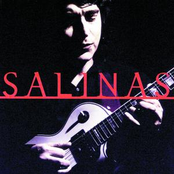Salinas

Biography
Born in Monte Grande, a town twenty miles south of Buenos Aires, Argentina, Luis Salinas was born into a musical family where he was encouraged by his father and step-father, both of whom are musicians, to play the guitar. Though he took his first musical steps at the age of eight, it wasn't until he was fourteen that he began to take the instrument seriously. It was at this time that Luis discovered the local music of Argentina, thus beginning a love affair with his own musical heritage as well...
Born in Monte Grande, a town twenty miles south of Buenos Aires, Argentina, Luis Salinas was born into a musical family where he was encouraged by his father and step-father, both of whom are musicians, to play the guitar. Though he took his first musical steps at the age of eight, it wasn't until he was fourteen that he began to take the instrument seriously. It was at this time that Luis discovered the local music of Argentina, thus beginning a love affair with his own musical heritage as well as the American jazz music he heard on the radio. Over the next few years he honed his skills as a guitarist (playing both electric and nylon string guitars) developing a unique style that was an amalgamation of his ever expanding musical tastes.
It was at "El Papagayo", a local night club, that people first had the chance to catch Luis' act. Applying what he had taught himself to the musical styles of bossa nova, Brazilian samba, Afro-Uruguayan candombe, salsa, boleros and jazz, his impressive technique and inherent talent won audiences over night after night. It was here that he began to sing as well, crooning folk songs to delight the crowds.
From 1985 until 1991, Luis worked for Egle Martin, a well known Argentinean singer, dancer, and producer who hired Luis to participate in "Ritos and Candombe," her successful show. Martin was so mesmerized by Luis' playing that she invited him to play on her bossa-nova album "El Atre Del Encuentro."
From this moment on, Luis became a band-leader. Undoubtedly, he was a more experienced, mature and self-assured musician. His late night jam sessions at "Oliverio" (and other Beunos Aires' clubs), attracted numerous foreign musicians who were playing in Buenos Aires. Many were part of the audience and some of them played with Luis, in terrific after-hours sessions. Among them guitarists Al Di Meola, Frank Gambale, Joe Pass, Scott Henderson, Baden Powell and Mike Stern; percussionists Ray Barretto, Winard Harper and Gumbi Ortiz; multi instrumentalist Hermeto Pascoal and other celebrities (Djavan, Taj Mahal, Horacio Salgan and others).
In 1993, Swedish pianist Anders Person invited Luis to play at the Umea Jazz festival, followed by a small tour of Sweden. After this tour, Luis went into the studio with Person to record "Aire De Tango," for the Dragon Label.
Back in Buenos Aires, Luis recorded his first solo album, a self-produced live recording called Luis Salinas En Vivo (released by an independent label in 1994). The record featured his own quintet and showcased his now inimitable style of Latino phrasings, jazz rhythms and all out blistering guitar hero posturing. The influences of guitar greats such as Jeff Beck, Joe Pass, and George Benson were becoming more evident, as was his potential as a recording artist.
In 1995, Luis was signed by the GRP Recording Company, and in March of '96 he recorded his debut for the label, entitled Salinas, with various musicians from his idol, George Benson's group. George was so impressed with Luis' playing that he invited him to his home in New Jersey so that the two could play together. It resulted in a hair-raising six hour jam session that neither player is ever likely to forget.
Salinas is an adventurous outing for the Argentinean guitar player and vocalist. Consisting of twelve Salinas originals, Salinas is produced by renowned producer, and GRP president Tommy LiPuma and (George Benson alum) Ricky Peterson. The record successfully combines Luis' Afro-Argentinean dynamic, with Peterson's textural, expansive arrangements. The opening track, La Salsalinas, begins with a melodic chord solo giving way to a rhythmic romp through Salinas' musical history. Fluid bop lines juxtaposed over an airy salsa swing create an almost cerebral groove. Paul Peterson's soft, brooding bass line pulsates knowingly, while drummer Michael Bland lays down the infectious groove. Funky Tango, sounds like George Benson on a beach in Argentina. The Mob (La Pesada) displays Luis' enhanced melodic sense, while Count on Me (Cuenta Conmigo) is a beautiful ballad, sung soulfully by Luis, proving that this guitar wizard isn't all chops.
After recording his debut for GRP, Luis was invited to open the label's night at the 30th edition of the Montreaux Jazz Festival, where he performed with Impulse! recording artist, pianist Danilo Perez.
Salinas, marks the arrival of a special talent. Luis Salinas is as versatile as he is astonishing. Now this national treasure can become an international star Read more on Last.fm. User-contributed text is available under the Creative Commons By-SA License; additional terms may apply.

